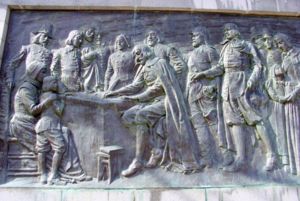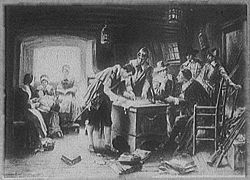 The
Mayflower Compact was the first governing document of Plymouth
Colony. It was drafted by the Pilgrims who crossed the Atlantic aboard the
Mayflower, seeking religious freedom. It was signed on November 11, 1620 (O.S.)
in what is now Provincetown Harbor near Cape Cod. The Pilgrims used the
Julian Calendar which, at that time, was ten days behind the Gregorian
Calendar, signing the covenant "ye .11. of November" (literal). Having
landed at Plymouth (so named by Captain John Smith earlier), many of the
Pilgrims aboard realized that they were in land uncharted by the London
Company. For this reason the Mayflower Compact was written and adopted,
based simultaneously upon a majoritarian model and the settlers'
allegiance to the king. Many of the passengers knew that earlier
settlements in the New World had failed due to a lack of government, and
the Mayflower Compact was in essence a social contract in which the
settlers consented to follow the rules and regulations of the government
for the sake of survival. The government, in return, would derive its
power from the consent of the governed. The
Mayflower Compact was the first governing document of Plymouth
Colony. It was drafted by the Pilgrims who crossed the Atlantic aboard the
Mayflower, seeking religious freedom. It was signed on November 11, 1620 (O.S.)
in what is now Provincetown Harbor near Cape Cod. The Pilgrims used the
Julian Calendar which, at that time, was ten days behind the Gregorian
Calendar, signing the covenant "ye .11. of November" (literal). Having
landed at Plymouth (so named by Captain John Smith earlier), many of the
Pilgrims aboard realized that they were in land uncharted by the London
Company. For this reason the Mayflower Compact was written and adopted,
based simultaneously upon a majoritarian model and the settlers'
allegiance to the king. Many of the passengers knew that earlier
settlements in the New World had failed due to a lack of government, and
the Mayflower Compact was in essence a social contract in which the
settlers consented to follow the rules and regulations of the government
for the sake of survival. The government, in return, would derive its
power from the consent of the governed.The compact is often referred to as the foundation of the Constitution of the United States, in a figurative, not literal, way, although is often mistakenly thought to be the first Constitution in America. The Fundamental Orders of Connecticut actually hold this honor. As a side note, the 'dread soveraigne' referred to in the document used the archaic definition of dread; meaning awe and reverence (for the King), but not fear.
|

